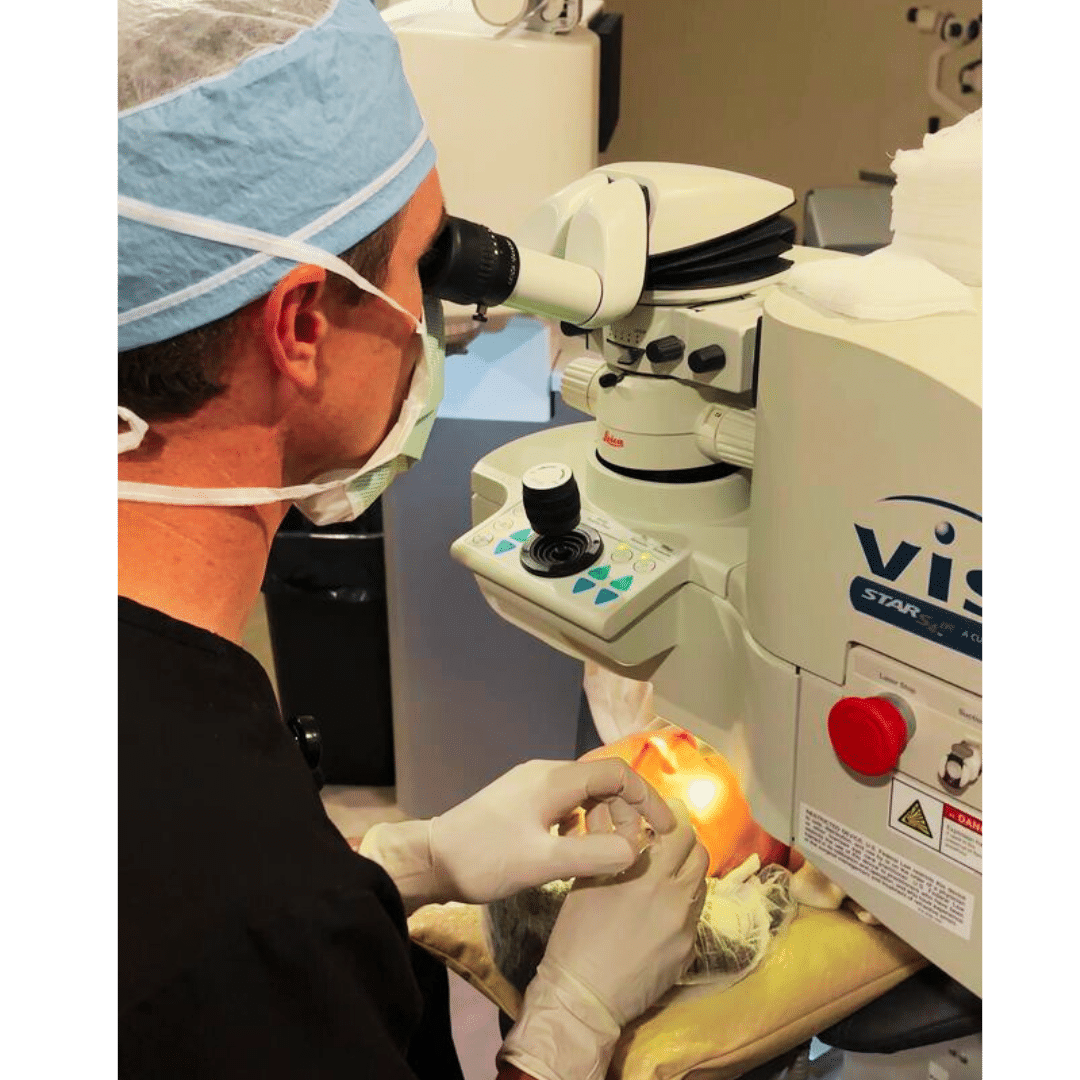LASIK eye surgery in Provo utah

LASIK is a fast, precise laser eye surgery that corrects nearsightedness, farsightedness, and astigmatism. Enjoy clear vision without the need for glasses or contacts, with a painless procedure that gives you lasting freedom and clarity.
Do you know someone who is considering LASIK? This is your chance to help them achieve clearer vision while earning cash for yourself!
We’re excited to invite you to participate in our LASIK Referral Program! For each person you refer who completes their vision correction procedure with us, you’ll receive a cash reward:
$50 for the first referral
$100 for the second
$150 for the third referral
And the best part? There’s no limit to the number of friends and family you can refer!
Eligibility criteria.
Referral rewards are issued only after the referred patient completes their LASIK procedure. Rewards will be provided in the form of a check, sent to the referring patient’s address on file. Referral must be a new patient, not currently in our system. The referred patient must mention the referring patient’s name during their free consultation to qualify. Rewards will be issued within 30 days of the completed surgery date. The referral rewards are not transferable. We reserve the right to modify or terminate this program at any time without notice. Employees and their immediate family members are not eligible to participate in this program.

Simple, Quick, and Life-Changing
LASIK is a quick, painless procedure that can give you clear vision without glasses or contacts.
A laser creates a tiny flap on your cornea to prepare for reshaping. This is done in seconds and is pain-free.
A second laser reshapes your cornea to correct nearsightedness, farsightedness, or astigmatism, improving how light focuses in your eye.
The flap is set back in place, naturally healing without stitches. Most people see better within hours.
At Utah Valley Eye and LASIK Center, LASIK is more than just a procedure—it’s a life-changing step toward clearer vision and a better life. From your first consultation to post-op care, we’re committed to making your entire journey comfortable and seamless, with your improved vision being our top priority.
You’ll receive personalized care from expert surgeons, Dr. Gardiner and Dr. Christensen, who will be with you every step of the way. Unlike other centers where you meet the surgeon on the day of surgery, our team provides ongoing support before, during, and after your LASIK for a truly reassuring experience.
Your LASIK procedure is fully customized using iDesign technology, which captures over 1,200 detailed measurements of your eyes. This advanced technology ensures a treatment plan tailored specifically to you, maximizing your vision results for a clearer, brighter future.
We prioritize your safety and comfort with the latest in bladeless LASIK technology. Our procedures use advanced eye tracking and iris registration features, providing precision and enhanced accuracy, so you can feel confident in achieving the best possible vision outcome.
Save hundreds! Free consultations are available for a short time only.
At Utah Valley Eye Center, our experienced LASIK surgeons specialize in laser eye surgery and vision correction procedures tailored to meet your unique needs. With years of expertise in performing LASIK, we pride ourselves on providing personalized, patient-centered care to every person who walks in our doors.
Our dedicated LASIK doctors take the time to understand your specific vision requirements, ensuring the best possible outcomes for your LASIK surgery.

lasik surgeon
Dr. Gardiner is a board certified, fellowship trained corneal and refractive surgeon who specializes in LASIK, ICL, RLE, and cataract surgery. He has a particular commitment to vision corrective surgery, having had LASIK himself in 2005.
Dr. Gardiner grew up in Ogden, Utah and enjoys running, biking, and hiking in the mountains of Northern Utah. He is married with five children and enjoys serving the community of Utah Valley.

lasik surgeon
Dr. Christensen is a comprehensive ophthalmologist who specializes in cataract and refractive surgery. He enjoys practicing ophthalmology with its constantly evolving technology, and strives to keep up with and integrate the latest developments into his practice. He can relate to patients undergoing life-changing vision surgery having had LASIK himself during his medical training.
Dr. Christensen is a Utah native and enjoys providing eye care so close to home. He is married with three children and a dog. He enjoys movies, golf, being outdoors, and amateur woodworking.
Utah Valley Eye Center offers LASIK at a competitive rate of $2,300 per eye. We provide discounts for students, police, fire, military, teachers, or healthcare workers.
When you choose us, your investment covers not only the procedure, but also all pre- and post- operative visits for a year, along with an enhancement within the first year if needed.
Be cautious of tempting advertisements for LASIK that promise unrealistically low rates, these rates often reflect minimal corrections and may not include the comprehensive care you deserve.
We understand that the cost of LASIK is a big factor in your decision. Investing in your vision is a big step, and we’re here to make the process clear and easy to understand. You can trust us to provide straightforward information without any hidden fees or unexpected surprises.
If you have any questions about the cost of LASIK or what to expect, feel free to reach out- we’re here to help!
This payment can be made using cash, check, or credit card.
Utah Valley Eye Center offers a 12-24 month no-interest financing plan with a 50% down payment at the time of service.
Flexible and health care savings accounts can be used to cover the costs of your LASIK procedure. Talk to your employer about setting aside money for you to put toward the costs of your surgery. It is a good idea to find out if you are a candidate before making such an election. We offer a free screening to make sure you are a candidate and to give you a better idea of how much to set aside.
The IRS has declared laser eye surgery to be a valid medical expense, thus making it tax-deductible.

Whether you’re ready to book a consultation or simply have questions, our friendly team is here to help guide you through every step of the process.
Most patients feel well enough to drive the next day and return to daily routines within a few days. While your vision may continue to improve and stabilize over the following weeks, full healing typically takes about three months. Every patient heals a little differently, so our team at Utah Valley Eye Center will guide you through every step of recovery.
After LASIK eye surgery, you’ll need to avoid swimming in pools, lakes, hot tubs, or any unclean water for at least two weeks to prevent infection. We also recommend staying away from dusty, dirty, or windy environments that could irritate your healing eyes. At Utah Valley Eye Center, we’ll give you a full list of post-op guidelines to help you heal safely and quickly.
LASIK permanently reshapes your cornea, so the vision correction itself doesn’t wear off. However, most people will naturally develop age-related near vision changes (called presbyopia) around age 45, which may require reading glasses. This change is due to aging and not LASIK wearing off. Many patients at Utah Valley Eye Center enjoy clear distance vision for decades after LASIK.
Yes, LASIK can safely and effectively correct mild to moderate astigmatism. During your free consultation at Utah Valley Eye Center, our experienced team will measure your corneal shape and determine if you’re a good candidate for LASIK or another vision correction option.
You won’t need to worry, blinking is prevented with a gentle eyelid holder, and numbing drops help reduce the urge to blink. Plus, the LASIK laser tracks your eye movements in real time. If your eye shifts, the laser pauses instantly and resumes only when your eye is properly aligned. At Utah Valley Eye Center, Dr. Gardiner and Dr. Christensen use the latest safety technology to ensure precise results.
Yes, You’ll receive numbing eye drops (called proparacaine) before and during your LASIK procedure to keep your eyes completely comfortable. These drops prevent pain but allow you to stay awake and relaxed. At Utah Valley Eye Center, we also offer a mild oral sedative like Valium if you’re feeling nervous on the day of surgery.
Yes, LASIK has been FDA approved since the 1990s and is considered a safe and effective procedure for correcting vision. The lasers used in LASIK, including those at Utah Valley Eye Center, are approved by the FDA and meet strict safety standards. Millions of people worldwide have had LASIK with high satisfaction rates.
You must be at least 18 years old to qualify for LASIK. Dr. Christensen and Dr. Gardiner recommend that your prescription be stable for at least one year before moving forward.
Yes, many people in their 40s are great LASIK candidates. If you’re starting to notice changes in your near vision (presbyopia), we can also talk about blended options like monovision. For patients over 50, Refractive Lens Exchange (RLE) is often a better long-term option we’ll help you understand what’s best for your age and vision goals.
LASIK at Utah Valley Eye Center is performed by Dr. Jeffrey Gardiner, and Dr. Michael Christensen, two of Utah’s most trusted vision correction surgeons. Both doctors have years of experience performing customized LASIK procedures and are known for their patient-first approach and exceptional outcomes.
Most patients return to work or school the Monday after surgery. We usually perform LASIK on Fridays so you can rest over the weekend. If your job involves a lot of screen time or physical activity, we’ll give you specific guidance during your consultation.
LASIK is considered a very safe procedure, but like any surgery, it does come with some risks. The most common are temporary dry eye or infection. You’ll use antibiotic eye drops for seven days after surgery to reduce the risk of infection. Your LASIK surgeon will also check for any signs of dry eye before moving forward with the procedure. If dry eye does happen, it’s usually short-term and can be treated with drops or other options.
Most people notice clearer vision immediately after the procedure, but it won’t be perfect right away. Your vision will continue to improve over the next several days. You’ll have a post-op visit the next day with one of our LASIK surgeons, Dr. Gardiner or Dr. Christensen. Many patients feel comfortable enough to drive themselves to that appointment. It’s normal for vision to fluctuate during the first few weeks, and one eye may heal faster than the other.
LASIK isn’t painful, but you may feel some pressure during part of the procedure. Before surgery, your eyes are numbed with a drop called proparacaine so you won’t feel pain. Most patients describe a brief feeling of pressure during flap creation that lasts less than a minute. After the procedure, it’s normal to have some discomfort, burning, or watering for about four hours while your eyes begin to heal.
Most health and vision insurance plans consider LASIK an elective procedure, so it typically isn’t covered. At Utah Valley Eye Center, we offer flexible payment plans with 0% interest to make LASIK more affordable. Many patients also use FSA or HSA funds to help with costs.
At Utah Valley Eye Center, LASIK costs $2,300 per eye, or $4,600 total, which includes your consultation, surgery, and all pre- and post-op care. We also offer 0% interest payment plans and accept HSA/FSA funds to make LASIK more affordable.
If you’re not a candidate for LASIK, there are still excellent alternatives. At Utah Valley Eye Center, we offer procedures like EVO ICL, and Refractive Lens Exchange (RLE). During your free consultation, our surgeons will help you understand which vision correction option is the best fit for your eyes and lifestyle.
Yes, you can have cataract surgery after LASIK. Since LASIK changes the shape of your cornea, it can affect the measurements we use to select the right lens for cataract surgery. At Utah Valley Eye Center, we use advanced tools like ORA intraoperative aberrometer during surgery to help ensure the most accurate lens power is chosen, even if you’ve had LASIK in the past.
Yes, Utah Valley Eye Center offers free LASIK consultations. Having a LASIK consultation is the first step to find out if you are a good LASIK candidate. During this appointment, we’ll check your eyes and answer any questions you have about the procedure, recovery, and cost. If you’re ready to see if LASIK is right for you, request a free LASIK screening.